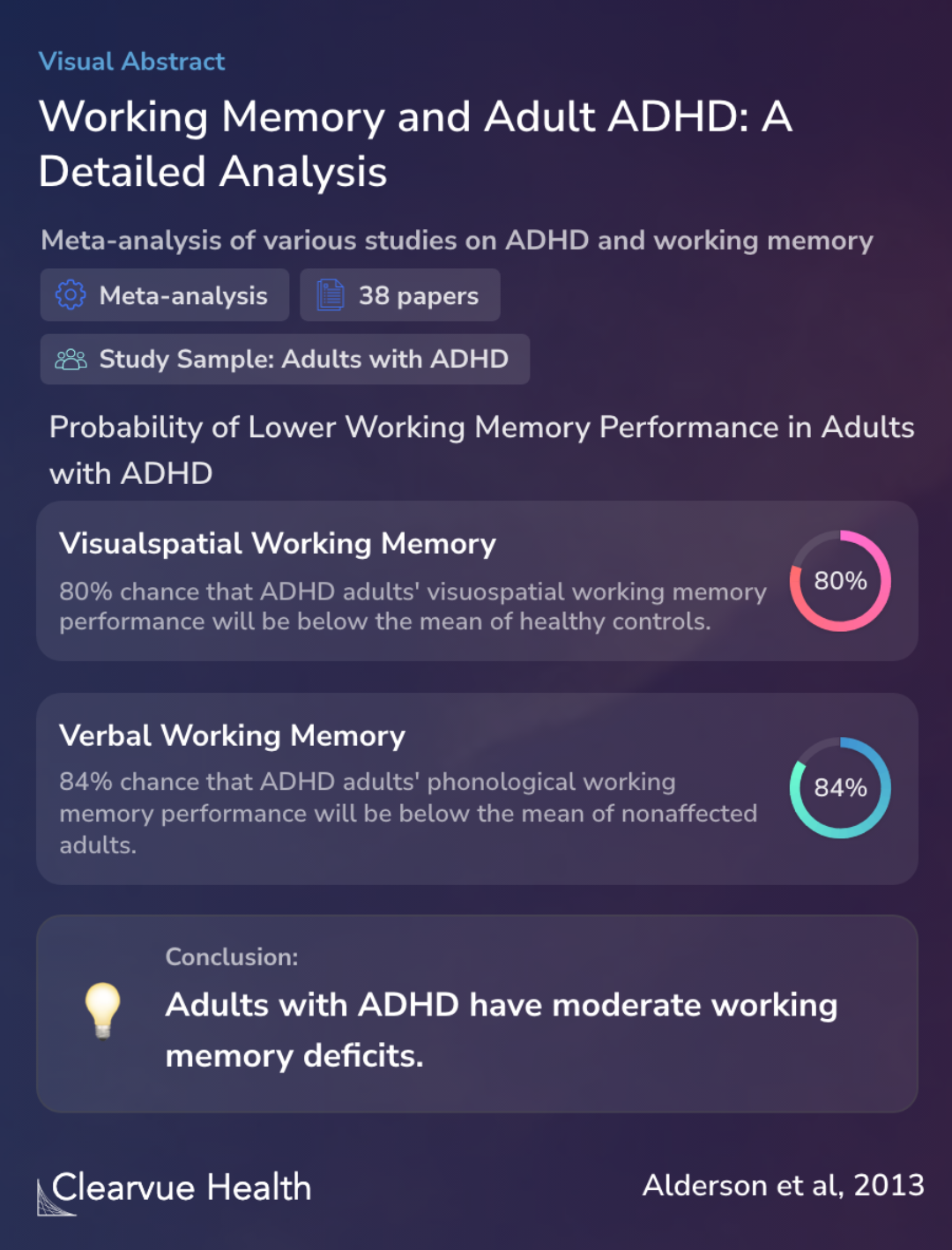Dark
Visual Abstract
Attention-deficit/hyperactivity disorder (ADHD) and working memory in adults: a meta-analytic review
Working Memory and Adult ADHD: A Detailed Analysis
Alderson RM, Kasper LJ, Hudec KL, Patros CH
Summarized by:
December 24, 2023
study source
Neuropsychology
2013 May

🔎
What they studied
The main research question was whether working memory deficits are a core feature of adult ADHD.
💡
What they found
The study found moderate differences in working memory between adults with and without ADHD.
👩⚕️
Why it matters
These findings suggest working memory issues are a persistent aspect of ADHD in adults.
Objectives
Understanding working memory in individuals with ADHD is essential, as it plays a crucial role in attention and impulse control. Working memory, a part of the brain that temporarily stores and uses information, often shows signs of weakness in people with ADHD. This weakness affects both verbal and visual/spatial information management, leading to challenges in focusing and task management. The paper highlights that while symptoms like hyperactivity might decrease as people with ADHD age, issues with attention and impulsivity often persist, potentially due to ongoing working memory difficulties.
Study Quote
Within the last decade, working memory (WM) has garnered increased interest as a potential core deficit or endophenotype of attention-deficit/hyperactivity disorder (ADHD).
Methods
The authors of the paper conducted a thorough examination of existing literature on ADHD and working memory. They used databases such as PsycINFO, Web of Science, and PubMed to gather information, ultimately analyzing 38 studies focused on adults with ADHD. This method allowed them to create a comprehensive overview of the existing research in this field.
Study Quote
Literature searches were conducted using the PsycINFO, Web of Science, and PubMed databases, and yielded 38 studies of WM in adults with ADHD.
Results
The results of the paper revealed that adults with ADHD generally show moderate differences in working memory performance compared to those without ADHD. These differences were observed in both phonological (related to verbal information) and visuospatial (related to visual and spatial information) working memory domains.
There is a high probability that adults with ADHD will perform worse in both phonological and visuospatial working memory tasks compared to controls.
Study Quote
Results revealed moderate-magnitude between-group effect sizes (ESs) across both WM domains. In addition, several task-moderating variables explained significant ES variability among PH and VS studies.
Conclusions
In conclusion, the paper indicates that working memory deficits are a persistent issue in adults with ADHD. This finding is significant as it suggests that the variability in research methods might be a reason why these deficits have not been consistently identified in past studies. The study’s results provide a clearer picture of the challenges faced by adults with ADHD and emphasize the need for varied approaches in studying and addressing these issues.
Study Quote
Collectively, these findings indicate that WM deficits persist into adulthood and suggest that methodological variability may explicate why WM deficits have not been uniformly detected in previous experimental studies.
Key Takeaways
Persistent Working Memory Deficits
Adults with ADHD consistently exhibit working memory challenges, highlighting the need for targeted interventions.
Methodological Variability
Variations in research methods have led to inconsistent findings, underscoring the importance of standardized approaches in ADHD research.
Moderate Impairment
The study reveals a moderate level of working memory impairment in adults with ADHD, impacting daily functioning.
Context
Multiple studies have shown that ADHD affects working memory, as demonstrated by this meta-analysis. For instance, a study by Roth et al. in 2004 explored the connection between verbal learning, working memory, and ADHD. They found that individuals with ADHD struggle more with working memory and verbal learning, which might be influenced by anxiety rather than just difficulties in organizing thoughts. This adds a layer of complexity to our understanding of ADHD's impact on learning and suggests that treating anxiety could also be beneficial for those with ADHD.
The potential for improving working memory in individuals with ADHD is also highlighted in other research. A 2005 study by Klingberg et al. found that specific training exercises could lead to long-term improvements in working memory and ADHD symptoms. This shows that with the right practice and training, there is a possibility for enhancing cognitive functions in those with ADHD.
Another fascinating aspect is the role of motivation in improving working memory in individuals with ADHD. A study by Dovis et al. in 2012 found that motivational incentives like money and gaming could improve working memory in children with ADHD. Although these incentives did not normalize working memory, they significantly improved task persistence. This suggests that motivational strategies might be a valuable tool for parents and educators in helping children with ADHD to perform better in tasks.